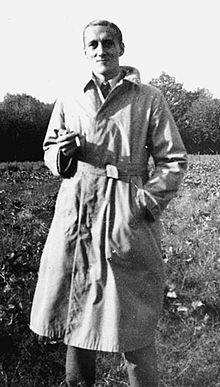Jocelyn Brooke
This article includes a list of general references, but it remains largely unverified because it lacks sufficient corresponding inline citations. (May 2009) |

Bernard Jocelyn Brooke (30 November 1908 – 29 October 1966) was an English author and naturalist. He wrote several unique, semi-autobiographical novels, as well as some poetry. His most famous works include the Orchid Trilogy—The Military Orchid (1948), A Mine of Serpents (1949), and The Goose Cathedral (1950)—and The Image of a Drawn Sword (1950).
Life and career[]
Brooke was born at Folkestone in Kent, the third child of a wine merchant, who with his wife was a Christian Scientist.[1] Sent initially to the King's School, Canterbury, Brooke was deeply unhappy there, and ran away twice. He then was moved to at Bedales School before going up to Worcester College, Oxford, Brooke's childhood revolved mostly around his principal interests of amateur botany and fireworks, in the shadow of the First World War. "When the Second World War began he enlisted in the Royal Army Medical Corps (RAMC) and became one of the pox wallahs, those working to treat venereal disease. Brooke was decorated for bravery."[2]
Elements of his experiences, and his love of the military life, appear in most of his subsequent works, to the extent that much of his fiction can be regarded as at least partly autobiographical novels.
Though the Orchid Trilogy strays into a typically English vein of humour, the idyllic land of his childhood and his obsession with le paradis perdu often bring in an element of intense melancholy, something developed in paranoia and isolation in The Image of a Drawn Sword.
Brooke's biographical non-fiction focuses on other authors who shared at least some of his own sensibilities: in particular Ronald Firbank, the subject of two of his books, and Denton Welch, the first edition of whose journals Brooke edited, as well as a collection of short stories published at a time when Welch was otherwise out of print.
Brooke's reputation suffered after his death and it has never really recovered. Considered by Anthony Powell to be under-rated, some of his writings have occasionally appeared in paperback in recent years.
The Goose Cathedral[]
The old Seabrook Lifeboat station, which is the defining symbol of the third novel in Brooke's Orchid Trilogy, was turned into the Boathouse Café in the 1930s. It is described thus at the end of the book: It was a grey, chilly evening, threatening rain; by the time I reached the bottom of Hospital Hill, it was quite dark. Dimly-lighted, the Goose Cathedral loomed through the blackness; I crossed the road, and approached the back entrance, facing towards the camp. A small conservatory or 'winter garden', like some salvaged fragment of the Crystal Palace, had been built on to this side ...
In the faint electric light, the interior of the café seemed enormous, barn-like...down the sides of the room were placed a number of solid, mahogany tables: the light gleamed vaguely on their polished surfaces...I realized that I was sitting, at last, beneath the roof of the Goose Cathedral - that sinister and sacrosanct chapel-by-the-sea where, in my childhood, the enormous blue-and-red lifeboat had crouched, mysteriously, like a sea-monster in its lair.
Bibliography[3][]
Fiction:
- The Orchid Trilogy:
- The Military Orchid (1948)
- A Mine of Serpents (1949)
- The Goose Cathedral (1950)
- The Scapegoat (1948)
- The Image of a Drawn Sword (1950)
- Passing of a Hero (1953)
- Private View (1954)
- The Dog at Clambercrown (1955)
- The Crisis in Bulgaria (1956)
- Conventional Weapons (1961)
Children's Fiction:
- The Wonderful Summer (1949)
Non-fiction:
- The Wild Orchids of Great Britain (1950)
- Ronald Firbank (1951)
- The Denton Welch Journals [as editor] (1952)
- The Flower in Season (1953)
- Elizabeth Bowen (1954)
- Aldous Huxley (1954)
- Ronald Firbank and John Betjeman (1962)
- Denton Welch: A Selection from his Published Works [as editor] (1963)
- The Birth of a Legend: a Reminiscence of Arthur Machen and John Ireland (1964)
Poetry:
- Six Poems [privately printed] (1928)
- December Spring (1946)
- The Elements of Death (1952)
Journal articles:
- Notes on the Occurrence of Orchis Simia Lamarck in Kent. The Journal of Botany (November 1938)
- A New British Species of Epipactis [co-authored with Francis Rose] The Journal of Botany (April 1940)
References[]
- ^ Blondel, N., "Brooke, (Bernard) Jocelyn (1908–1966)", Oxford Dictionary of National Biography, first published 2004; online ed., May 2010.
- ^ Blondel, N., "Brooke, (Bernard) Jocelyn (1908–1966)", Oxford Dictionary of National Biography, first published 2004; online ed., May 2010.
- ^ A Checklist of Jocelyn Brooke: His Writings Together with Some Appreciations. Bertram ROTA. 1963.
External links[]
- 1908 births
- 1966 deaths
- Alumni of Worcester College, Oxford
- People educated at Bedales School
- People from Folkestone
- Royal Army Medical Corps officers
- LGBT writers from England
- Gay writers
- 20th-century English novelists
- 20th-century British medical doctors
- English male novelists
- 20th-century English male writers